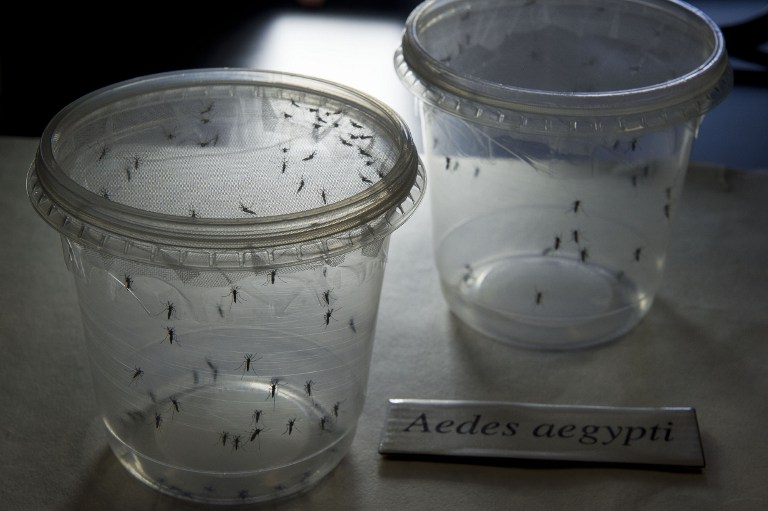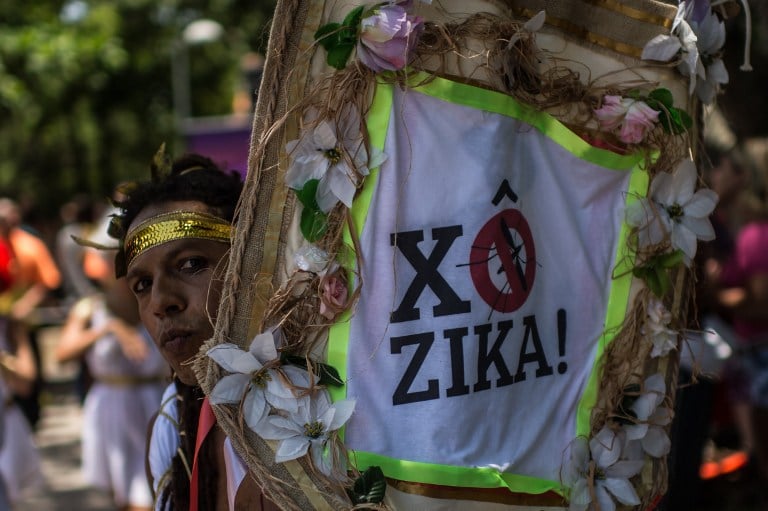In Brazil, 404 babies were born with microcephaly in 2015 – a disorder in which a foetus’s brain does not develop properly in the womb -- with thousands more cases under investigation.
Of those, 17 babies were infected with the zika virus, a mosquito-borne disease, and 76 have died. Due to these developments, the World Health Organisation declared the zika outbreak a “public health emergency of international concern” earlier this month.
Health authorities are investigating whether zika, which was first discovered in Uganda, is behind the rise in microcephaly, and fingers have been pointed at African tourists for bringing the virus to Brazil. NPR reported earlier this month that “some doctors speculate it could have come with African visitors during the [2014 Football] World Cup”.
Two doctors from the Saõ Paulo Institute for Tropical Medicine wrote that is was the “strongest hypothesis” for the outbreak of zika in Brazil.
Other media reports (from The Guardian, Reuters, and Mail & Guardian) ascribed blame to either a visitor from Africa or Oceania.
Why were Africans under suspicion?
The reports contain no sources for the statement and there is no mention of it on the Brazilian government’s official website or the ministry of health’s.
The Brazilian health authorities have not responded to numerous inquiries from Africa Check about whether they initially blamed African tourists for the zika outbreak, and whether they still do.
The closest that Africa Check could find was a statement by Brazilian president Dilma Rousseff: “The zika virus, transmitted by mosquito, has no nationality. It began in Africa, spread throughout Southeast Asia, the Oceania and is now in Latin America. And this was an exceptionally fast process, from last year.” (Note: This was translated using Google Translate, so excuse our Portuguese.)
First zika cases recorded in the 1950s
In reality, the migration of the zika virus from Africa to Brazil has taken decades, and it went the long way round, scientific literature shows.
The virus was first isolated in a rhesus monkey in Uganda's Zika forest in 1947 while scientists were studying yellow fever. In 1952, a paper was published describing the disease in humans in Uganda and Tanzania.
Zika is a flavivirus, which is a family of viruses that are usually carried by ticks and mosquitoes, and is closely related to other diseases such as dengue, yellow fever and Japanese encephalitis (a viral inflammation of the brain).
Between 1952 through to 1981, zika infections were reported in numerous African countries, and then later in parts of Asia, including India, Malaysia, the Philippines, Thailand, Vietnam and Indonesia.
From Africa and Asia to Oceania
Until 2007 no one had been diagnosed with the virus outside of its endemic areas in Africa and Asia.
In that year, an outbreak was detected on Yap Island in Micronesia (which infected almost 75% of the population), which then spread to French Polynesia in 2013 and 2014 and a number of other Pacific islands.
Aedes mosquitoes -- a genus of mosquito found all over the world -- are considered the main carrier of the disease, as are other infected people. When mosquitoes bite a human who has the virus, they become infected too and transmit it to the next person they feed on. There have also been reported cases of zika being transmitted through sexual intercourse.
Different strains of zika virus
By analysing the evolutionary development of the zika virus, scientists believe that zika spread from Africa to Asia and not the other way around, Dr Petrus van Vuren from South Africa’s National Institute of Communicable Diseases told Africa Check.
“It is, however, not impossible that the virus might have been present in Asia long before it was detected eventually,” he said.
Because of this, three different genotypes, or collections of genes, of the zika virus developed: the African (east and west) and the Asian, Dr Anna-Belle Failloux, head of arboviruses and insect vectors at the Institut Pasteur in Paris, told Africa Check.
DNA tests showed that the zika virus that has struck Brazil is the Asian strain. The Centers for Disease Control and Prevention in the US told Africa Check that this made it unlikely that it came from an African country.
“The strain of zika virus detected in Brazil was most closely related to the Asian strain that had been circulating in French Polynesia,” they said.
How did the zika virus get to South America?
In a communique on the zika virus, the National Institute for Communicable Diseases says: “One could speculate that numerous introductions of either infected mosquitoes or infected travellers are necessary before a foreign arbovirus can become established in a new area, because the virus needs to be introduced into a capable vector population as well as host population.”
Asked how the virus could have arrived in Brazil, Failloux told Africa Check that it was more likely that it was brought by an infected traveller: “We cannot completely exclude an infected mosquito taking the plane [… but the] main and more realistic way to transfer the virus from one continent to another is through infected people.” The virus also causes no symptoms in 80% of cases, she said.
However, no countries from zika-virus-endemic Pacific countries competed in the 2014 Football World Cup, Didier Musso from the Institut Louis Malardé in Tahiti, French Polynesia, noted in a journal article.
Shortly thereafter though teams from the Pacific regions of French Polynesia, New Caledonia, Cook Islands and Easter Island - where the zika virus circulated in 2014 - competed in an international canoe sprint competition in Rio de Janeiro, Musso pointed out.
But even this is not a direct link to the current zika outbreak because it is possible that zika arrived in Brazil before that.
The first zika case in Brazil was confirmed with a laboratory test in May 2015, but “there were reports of 'dengue-like syndrome' occurring before this time,” the Centers for Disease Control and Prevention told Africa Check.
“It is more likely that the virus was already circulating and causing illness prior to May 2015, but had not been recognised as zika until later.”
Conclusion: Highly unlikely that an African traveller introduced zika to Brazil
Although the zika virus was first detected in Africa, three distinct strains of the virus now exist: the west and east African, and Asian. The Asian strain has been confirmed as the cause of Brazil's zika cases.
It is possible that the virus was brought by an infected traveller – possibly from Oceania which had the first documented cases of zika outside of its endemic areas in Africa and Asia – during a sporting event, whether it was the 2014 Football World Cup or an international canoe sprint competition shortly thereafter.
It is, however, possible that the virus was present in Brazil before these events, and was misdiagnosed.
Additional reading








Add new comment